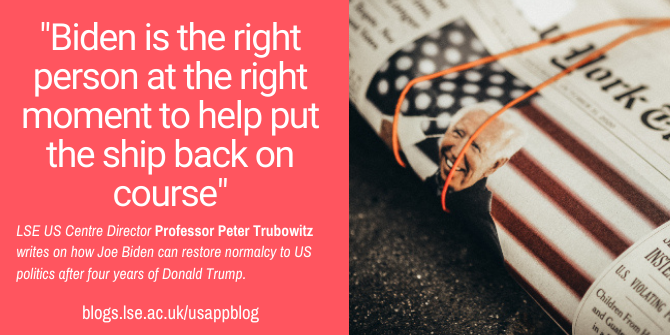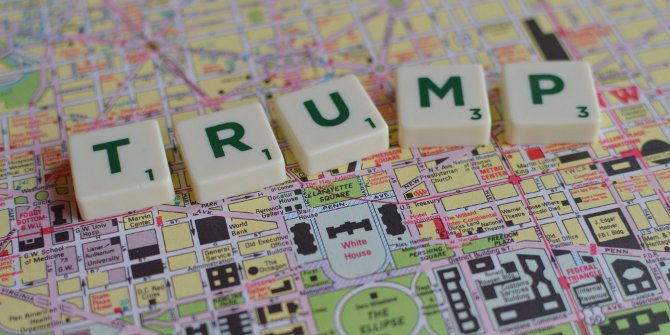 On Saturday, following several days of vote counting in key states which followed Election Day, former Vice President Joe Biden was declared to be the winner of the 2020 presidential election. LSE US Centre Director Professor Peter Trubowitz looks at the three main political challenges which President Elect Biden is likely to face, and whether Trump’s populist politics still have a future in US politics.
On Saturday, following several days of vote counting in key states which followed Election Day, former Vice President Joe Biden was declared to be the winner of the 2020 presidential election. LSE US Centre Director Professor Peter Trubowitz looks at the three main political challenges which President Elect Biden is likely to face, and whether Trump’s populist politics still have a future in US politics.
What stands out about the election?
Many things, but over the weekend I found myself reflecting on how professional and peaceful it was and remains. There was a lot of room for mischief in this election cycle and except for a couple of isolated incidents, we have not seen it. That is a credit to the country’s many state and local election workers, the federal intelligence services that “hardened” the electoral process against foreign interference, and to the American people who did their civic duty and voted in record numbers in the midst of a pandemic. Given the huge turnout in voting this election and the unprecedented way it had to be managed because of the COVID-19 health crisis, it went smoothly in spite of what many had feared.
What are Biden’s main political challenges?
Biden faces three main challenges, I think. The first is to restore a sense of normalcy to American political life after four years of Trump’s unhinged approach to governing: to restore competency in governing, to show empathy to those less fortunate, and perhaps most importantly, to respect the truth. This is not too much to ask and Biden is the right person at the right moment to help put the ship back on course. Second, Biden will also need to rebuild the Executive Branch whose various departments have been weakened by Trump’s efforts to get rid of professional civil servants and replace them with “second stringers,” leave them empty, or empower people to hollow them out from within. This is going to take time but most of these appointments will not require Republican approval. Finally, there is the need to deliver on the many forward looking, progressive policies that he ran on. Ideally, Biden would secure legislative consent for his policy proposals to make them more difficult to overturn in the future. However, because Republicans are likely to control the Senate, Biden will be forced to rely much more on executive orders to get things done when it comes to climate change, health care, and foreign policy — more than I think he would prefer. Look for Biden to quickly rejoin the Paris climate accord, recommit to the World Health Organization, rescind Trump’s travel ban on Muslim countries, and stop trying to deport Dreamers – those who came to the US as children without documentation.
Does Trumpism have a future in American politics?
If you mean by Trumpism, anti-globalism, populism (we vs them), and xenophobia, I don’t think it is going away anytime soon in America. Trump himself may decide to run for president in 2024, but even if he doesn’t, other Republicans will pick up the mantle and run with it, thinking it is the best way to secure the Republican nomination and if they drop the racism, a good campaign platform for winning a general election in America. After all, Trump won 70 million votes. That is a pretty impressive vote tally and significantly more than Trump won in 2016. Much of the post-election denial of the outcome we see among Trump “wannabes” in the Republican party like Senators Tom Cotton (R-AR), Josh Hawley (R-MO), and Ted Cruz (R-TX) reflects a strong desire to keep the “movement” alive and possibly, to campaign for the presidency in 2024 on charges that “the 2020 election was stolen.”

Photo by Jon Tyson on Unsplash
What kind of role will Vice-President Elect Kamala Harris play in the new administration?
I think Harris will have a large policy portfolio and be someone that Biden relies on for political counsel — as he puts it, the last one in the room with him after all the policy advisors leave. Biden has indicated more than once that he views himself as transitional leader. The more fully integrated Harris is in policy deliberations and decision-making, the stronger her claim to be Biden’s successor will be. I would look for her to play a critical role in the area of race and policing, voter disenfranchisement, and civil rights — no small thing at a time when race is roiling America’s politics.
What should we expect from Trump in the coming days?
Slowly coming to terms with the fact that he has lost the election. Calling for vote recounts is a waste of time (recounts rarely make a difference) and Trump’s argument that the “fix was in” in terms of mail-in ballots doesn’t pass muster. The problem for Trump is that many down-ballot Republicans who were running for election did in fact win. If mail in ballots didn’t prevent other Republicans on the ballot from winning, why should Americans think those ballots explain his defeat? The real issue here is how soon Trump accepts defeat, how he frames it, and how much damage he may do on the way out of office.
- This Q&A is based on an interview with Bloomberg Surveillance [segment begins at 3:35] on 9 November.
Please read our comments policy before commenting
Note: This article gives the views of the author, and not the position of USAPP– American Politics and Policy, nor of the London School of Economics.
Shortened URL for this post: https://bit.ly/32qNIb3
About the author
 Peter Trubowitz – LSE US Centre
Peter Trubowitz – LSE US Centre
Peter Trubowitz is Professor of International Relations, and Director of the LSE’s US Centre. His main research interests are in the fields of international security and comparative foreign policy, with special focus on American grand strategy and foreign policy. He also writes and comments frequently on US party politics and elections and how they shape and are shaped by America’s changing place in the world.







Complete the repairs; don’t try to launch a leaky boat!
Lessons to be learned again?